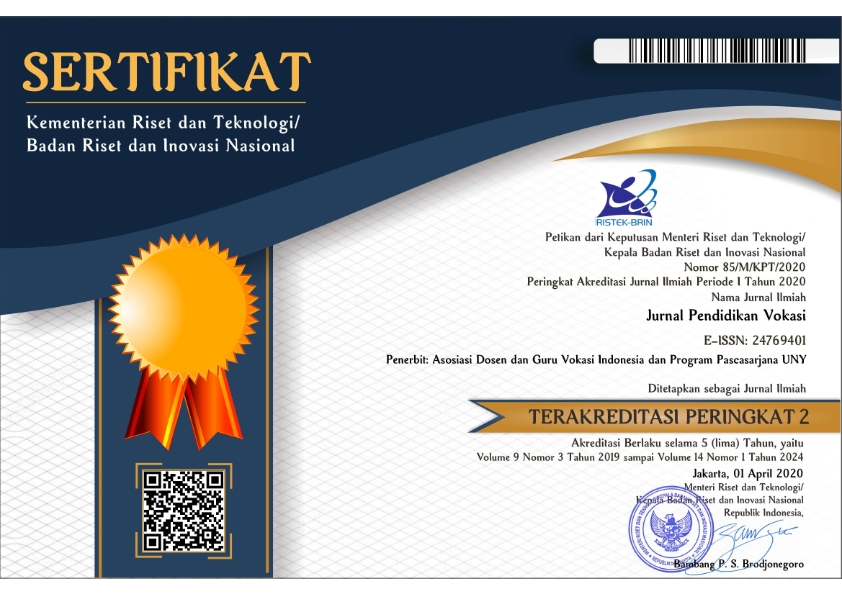Pengaruh metode student teams-achievement division (STAD) dan problem based learning terhadap hasil belajar ditinjau dari potensi akademik siswa SMK otomotif
DOI:
https://doi.org/10.21831/jpv.v2i2.1024Keywords:
influence, teaching methods, academic potentialAbstract
Penelitian ini bertujuan untuk menguji: (1) pengaruh metode pembelajaran Student Teams-Achievement Divitions (STAD) terhadap peningkatan hasil belajar ditinjau dari potensi akademik siswa, (2) pengaruh metode pembelajaran Problem Based Learning terhadap peningkatan hasil belajar ditinjau dari potensi akademik siswa, dan (3) interaksi antara metode pembelajaran dan potensi akademik siswa dalam pengaruhnya terhadap pencapaian hasil belajar. Penelitian ini merupakan penelitian eksperimen semu (quasi-experimental research) dengan desain faktorial yang dilakukan dengan memberikan perlakuaan dalam metode pembelajaran. Pada penelitian ini menggunakan dua kelas sebagai sampel dan kedua kelas tersebut diberikan pembelajaran dengan menggunakan dua metode berbeda. Satu kelas menggunakan metode STAD, sedangkan kelas yang lainnya diberikan metode PBL. Untuk variabel bebas yang lain yaitu variabel atribut potensi akademik siswa dijadikan sebagai variabel yang ikut mempengaruhi variabel terikat. Rancangan yang digunakan dalam penelitian ini menggunakan desain faktorial 2 x 2. Penelitian ini menggunakan sampel dengan jumlah 52 siswa dengan kelompok STAD 25 siswa dan kelompok PBL 27 siswa. Teknik analisis data dalam penelitian ini menggunakan analisis varian (ANAVA) dengan progam SPSS 18.Hasil penelitian menunjukkan bahwa: (1) terdapat interaksi antara metode pembelajaran dengan potensi akademik siswa dan pengaruhnya terhadap pencapaian hasil belajar siswa, (2) secara keseluruhan tidak terdapat perbedaan hasil belajar antara siswa yang diajar dengan metode pembelajaran Student Teams-achievement Division STAD dan metode pembelajaran Problem Based Learning, (3) secara keseluruhan terdapat perbedaan hasil belajar antara siswa yang mempunyai kemampuan potensi akademik tinggi dan rendah, (4) tidak terdapat perbedaan hasil belajar siswa yang diajar dengan metode Student Teams-achievement Division STAD antara siswa yang mempunyai kemampuan potensi akademik tinggi dan rendah, (5) terdapat perbedaan hasil belajar siswa yang diajar dengan metode Problem Based Learning antara siswa yang mempunyai kemampuan potensi akademik tinggi dan rendah.
THE INFLUENCE OF METHOD OF STUDENT TEAMS-ACHIEVEMENT DIVISION (STAD) AND PROBLEM BASED LEARNING ON LEARNING OUTCOMES VIEWED FROM ACADEMIC POTENTIAL STUDENTS OF SMK AUTOMOTIVE
Abstract
This study aims to examine: (1) the influence of teaching methods Student TeamsAchievement Divitions (STAD) for improvement learning outcomes viewed from academic potential students , (2) the influence of teaching methods Problem Based Learning for improvement learning outcomes viewed from academic potential students, and (3) the interaction between teaching methods and the academic potential students and its effects on the students learning outcomes. This study was a quasi experimental with factorial design study conducted by giving treatments in the learning method. In this research using two-class and the second class as a sample is given of learning by using two different methods. One class of STAD method, whereas the other classes given PBL method. For the other independent variables are the academic potential students attribute variables used as variables that influence the dependent variable. The research designed employed in this study was a 2 x 2 factorial design. This study involved a sample consisting of 52 students, divided into the STAD group (25 students) and the PBL group (27 students). The data were analyzed by means of the analysis of variance (ANOVA) using the SPSS 18 program. The results of the study were as follows: (1) there is a interaction between the method of learning with academic potential students and its effect on student achievement, (2) On the whole, there is no difference between the learning outcomes of students taught with the learning method Student Teams-Achievement Division STAD and Problem Based learning, (3) On the whole, there are differences in learning outcomes between students who have academic potential ability of high and low, (4) there is no difference in learning outcomes of students who were taught by the method of student Teams-achievement Division STAD between students who have the academic potential ability high and low, (5) there are differences in learning outcomes of students who were taught by the method of Problem Based learning between students who have the academic potential ability high and low.
References
Amir, M. Taufiq. (2010). Dasar-dasar Proses Belajar Mengajar. Bandung: Grasindo.
Anonim. (2012). Peran dalam Pengukuran dan Evaluasi. Diambil pada tanggal 18 Mei 2012, dari http://episentrum.com/artikel-psikologi/peran-dalam-pengukuran-dan-evaluasi.
Anonim. (2012). Psychological Test. Diambil pada tanggal 18 Mei 2012, dari http://www.enotes.com/psycological-test-reference.
Dittrich, Joachim et al. (2009). Standardisation in TVET Teacher Education. Alle Reche vorbehalten: Peter Lang GmbH.
Finch, Curtis R. & Crunkilton, John R. (1999). Curriculum Development in Vocational and Technical Education: Planning, Content, and Implementation. Sidney: Allyn and Bacon Inc.
Glazer, E. (2001). Problem-Based Instruction from Emerging Perspectives on Learning, Teaching, and Technology. Diambil pada tanggal 8 Mei 2012, dari http://www.projects.coe.uga.edu/epltt/index.php?title=Problem_based_instruction.
Ibnu Hajar. (2010). Cukup 5 Jam Memahami Psikotes dan TPA. Yogyakarta: Buku Biru.
Sanjaya, Wina. (2007). Strategi Pembelajaran Berorientasi Standar Proses Pendidikan. Jakarta: Kencana Prenada Media.
Slavin, Robert E. (1995). Cooperative Learning: Theory, Research, and Practice. Boston: Allyn and Bacon.
Slavin, Robert E. (2010). Cooperative Learning Teori Riset dan Praktek. Bandung: Nusa Media.
Sugihartono, dkk. (2007). Psikologi Pendidikan. Yogyakarta: UNY Press.
Suyono dan Hariyanto. (2011). Belajar dan Pembelajaran. Bandung: PT. Remaja Rosdakarya.
Downloads
Published
How to Cite
Issue
Section
License
The authors submitting a manuscript to this journal agree that, if accepted for publication, copyright publishing of the submission shall be assigned to Jurnal Pendidikan Vokasi. However, even though the journal asks for a copyright transfer, the authors retain (or are granted back) significant scholarly rights.
The copyright transfer agreement form can be downloaded here: [JPV Copyright Transfer Agreement Form]
The copyright form should be signed originally and sent to the Editorial Office through email to jpvokasi@uny.ac.id
Jurnal Pendidikan Vokasi by http://journal.uny.ac.id/index.php/jpv is licensed under a Creative Commons Attribution-ShareAlike 4.0 International License.














